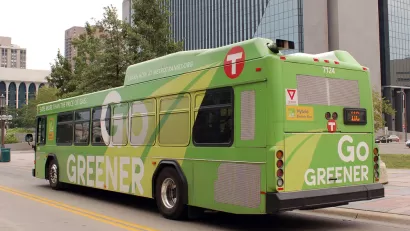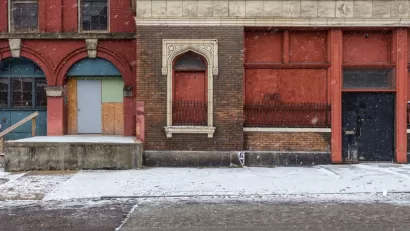The Daily Source of Urban Planning News

BLOG POST
Free Transit, But at What Cost?
Opinion: The movement toward fare-free transit might have more to do with optics and politics than planning.

BLOG POST
Active and Micro Mobility Modes Can Provide Cost-Effective Emission Reductions–If We Let Them
What role can active and micro modes (walking, bicycling, e-bikes and their variants) play in reducing emissions? Far more than most current emission reduction plans will achieve. We can do better!

Nevada Makes Historic Affordable Housing Investment
The state announced $500 million in grants to agencies and organizations building or preserving affordable housing in the state.

What Is the Best Way To Run a City?
City management models offer different benefits and drawbacks.

When Zoning Reform Isn’t Enough: How To Boost Missing Middle Housing
For upzoning efforts to result in a significant rise in new housing units, cities and states must do more than just change zoning codes to ensure missing middle housing is easy and affordable to build.

Minneapolis Leans Into Bus Rapid Transit
The city wants to become North America’s ‘bus rapid transit capital.’

Ohio to Demolish Thousands of Vacant Buildings
The state is funding a $150 million effort to raze blighted buildings to accelerate revitalization.

Using Data to Identify and Prioritize the Most Vulnerable
The Social Vulnerability Index (SVI) is a resource that can be used by public agencies to identify parts of a community that are most in need of investment.

Helicopter Noise Complaints Surge in New York
Residents argue the city and state must do more to regulate the hundreds of flights that criss-cross the area on a daily basis.

PLANOPEDIA
What Is Defensive Urbanism?
If you’ve ever noticed a public bench split in half by a metal bar, or a series of seemingly ornamental boulders blocking the sidewalk under a high-rise overhang, you’ve seen what is often described as defensive urbanism or ‘hostile architecture.’

How Big Data Informs Park Planning
Data analysis and research by national organizations are helping to ensure equitable distribution and provision of parks and recreational facilities.

Placemaking Redefined by a New Era of Federal Investment
Six tips for ensuring that new placed-based funding programs, such as the Build Back Better Regional Challenge, achieve the full potential of a new era of place-based federal investment.

How Mutual Aid Increases Community Resiliency
Recent devastating weather events highlight the importance of community connection in keeping people safe when infrastructure fails.

Chicago Makes ‘Pop-Up’ Bus Lanes Permanent
Even with the addition of 3.5 miles of permanent bus-only lanes, Chicago trails other cities in miles of dedicated bus lanes.

Baltimore’s Red Line Rail Project Back on the Table Thanks to New Governor
One of the most infamously anti-transit decisions of the past decade—Maryland Gov. Larry Hogan’s decision to cancel the Baltimore Red Line system expansion—could be reversed by the incoming governor.

New York City’s Tree Map Gets More Data
The online tool now shows granular, tree-level data that highlights the public health benefits and economic contributions of urban trees.

The Importance of Restoring Degraded Lands in Los Angeles County
The L.A. County Board of Supervisors just approved the Parks Needs Assessment Plus (PNA+), which highlights the need for transforming degraded lands such as landfills and oil fields into parks and open spaces, particularly in underserved communities.

Ohio Debates Expanded Rail Service
The state has the chance to apply for a piece of $2.3 billion in federal funding to improve and expand Amtrak service.

Chicago Transit Faces Steep Budget Gap
The region’s transit riders could see major fare hikes and reduced service if agencies don’t find new ways to make up for reduced fare revenues.
Pagination
planning NEXT
Appalachian Highlands Housing Partners
Mpact (founded as Rail~Volution)
City of Camden Redevelopment Agency
City of Astoria
City of Portland
City of Laramie
Urban Design for Planners 1: Software Tools
This six-course series explores essential urban design concepts using open source software and equips planners with the tools they need to participate fully in the urban design process.
Planning for Universal Design
Learn the tools for implementing Universal Design in planning regulations.



































